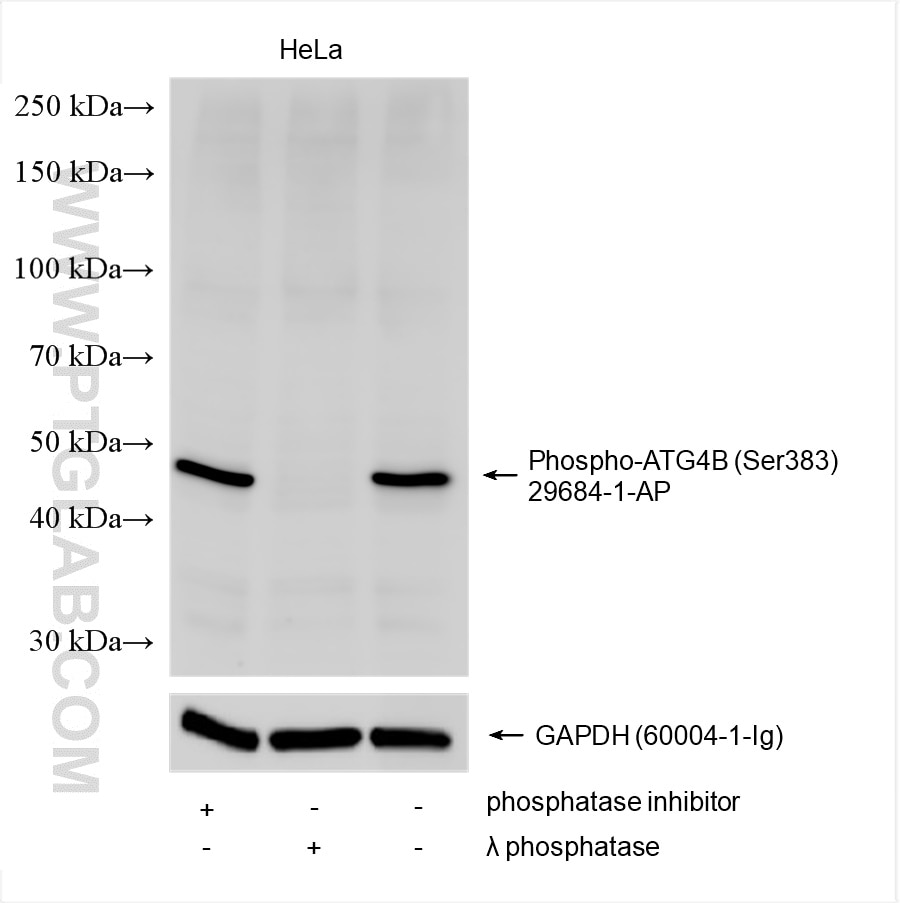Validation Data Gallery
Tested Applications
| Positive WB detected in | λ phosphatase treated HeLa cells |
Recommended dilution
| Application | Dilution |
|---|---|
| Western Blot (WB) | WB : 1:500-1:2000 |
| It is recommended that this reagent should be titrated in each testing system to obtain optimal results. | |
| Sample-dependent, Check data in validation data gallery. | |
Published Applications
| WB | See 1 publications below |
Product Information
29684-1-AP targets Phospho-ATG4B (Ser383) in WB, ELISA applications and shows reactivity with Human samples.
| Tested Reactivity | Human |
| Cited Reactivity | human |
| Host / Isotype | Rabbit / IgG |
| Class | Polyclonal |
| Type | Antibody |
| Immunogen | Peptide 相同性解析による交差性が予測される生物種 |
| Full Name | ATG4 autophagy related 4 homolog B (S. cerevisiae) |
| Calculated molecular weight | 44 kDa |
| Observed molecular weight | 44 kDa |
| GenBank accession number | BC000719 |
| Gene Symbol | ATG4B |
| Gene ID (NCBI) | 23192 |
| RRID | AB_2935420 |
| Conjugate | Unconjugated |
| Form | Liquid |
| Purification Method | Antigen affinity purification |
| UNIPROT ID | Q9Y4P1 |
| Storage Buffer | PBS with 0.02% sodium azide and 50% glycerol , pH 7.3 |
| Storage Conditions | Store at -20°C. Stable for one year after shipment. Aliquoting is unnecessary for -20oC storage. |
Background Information
ATG4B stimulates autophagy by promoting autophagosome formation through reversible modification of ATG8. In humans, microtubule-associated protein 1 light chain, LC3B, is the best-characterized ATG8 isoform, and ATG4B, but not three other ATG4 isoforms, displays a highly selective preference toward LC3B. MST4 phosphorylates ATG4B at serine residue 383, which stimulates ATG4B activity and increases autophagic flux. (PMID: 29232556, PMID: 36056541)
Protocols
| Product Specific Protocols | |
|---|---|
| WB protocol for Phospho-ATG4B (Ser383) antibody 29684-1-AP | Download protocol |
| Standard Protocols | |
|---|---|
| Click here to view our Standard Protocols |
Publications
| Species | Application | Title |
|---|---|---|
Transl Oncol Targeting STK26 and ATG4B: miR-22-3p as a modulator of autophagy and tumor progression in HCC |
